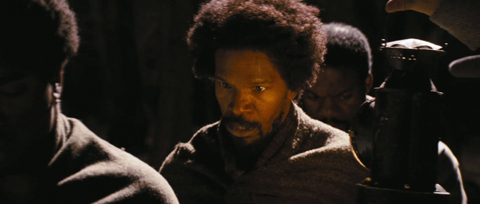
REVISIONIST HISTORY Jamie Foxx as the title character in 'Django Unchained.' |
It's a late April evening at Brown University and a crowd has gathered in an auditorium off the Main Green. Some guests have grey beards and hearing aids; most are teens and twentysomethings chatting excitedly.
Tonight's film, Django Unchained — Quentin Tarantino's Oscar-winning, $400 million-grossing seventh feature — needs little introduction, so professor of Africana studies Anthony Bogues offers a different kind of preface.
He introduces himself as the current director of Brown's Center for the Study of Slavery and Justice, which effectively opened its doors in February with free, public events like tonight's screening.
"The Center for the Study of Slavery and Justice, many of you may not know," he says, "emerged out of a series of discussions that happened on this campus between 2003 and 2006, in which we attempted to study the relationship of the origins of this university to the Atlantic slave trade." He refers to a sheet circulating around the room and encourages everyone — students, faculty, members of the Providence community — to sign up for updates about the center's progress.
"We are not just a scholarly center," he says. "We are a center with a public education mission."
Then the film rolls, in all of its cartoonish, bloody, pulpy, quasi-historical Tarantino-ness. It is a film that, among other things, purports to depict slavery in the antebellum American South. Over the course of the story, a slave named Broomhilda is branded on her face with a hot iron; bound and whipped while she shrieks in agony; locked naked in an underground metal cell called the Hot Box, then roused from the cell and carted away naked in a wheelbarrow. Other slaves are marched at gunpoint while wearing metal muzzles and shackles that cut their ankles raw. During one particularly gruesome scene, two shirtless slaves fight for the amusement of a plantation owner named Calvin Candie (played by Leonardo DiCaprio) who yells, "Keep fighting, niggers!" before one man kills the other by crushing his skull with a hammer.
The film's ending is vaguely analogous to that of Tarantino's Inglourious Basterds, in which Jews orchestrate the explosion of a movie theater holding Adolf Hitler and hundreds of Nazi officers. In Django, it is a white-pillared Mississippi plantation house called Candyland that detonates while the title character — played by Jamie Foxx — rides away with Broomhilda. A spattering of confused applause fills the auditorium as the lights flicker on.
The following night, many attendees return to a lounge in the Brown Campus Center for a panel discussion of the film with a Yale film scholar and two faculty members from Brown's Africana Studies department. During the conversation, Tarantino is compared to a P.T. Barnum-esque "carnival barker" and participants pick apart the veracity of Django's use of phrenology.
"This [film] isn't about African Americans," professor Corey Walker, chair of Brown Africana Studies, says at one point. "This is about the white imagination."
Bogues, the moderator of the discussion, ends with an anecdote about how he once tried to sell a screenplay about the life of Marcus Garvey, only to be told by producers: "Where is the white woman? . . . This movie will not sell if there is no white woman in it."
Though no one mentions it, the panel takes place on a notable anniversary. April 30, 2013 is exactly 10 years after Ruth Simmons — Brown's first female president and the first African American president in Ivy League history — addressed a letter to Brown faculty members and students inviting them to serve on a committee "that I hope will help the campus and the nation come to a better understanding of the complicated, controversial questions surrounding the issue of reparations for slavery."